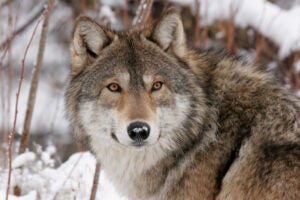
BRUSSELS—Following a concerted campaign by lobby interests seeking to decrease EU legal protections for large carnivores, the European Parliament has adopted a Resolution on the issue of the protection of livestock farming and large carnivores in Europe at its Plenary session in Strasbourg, proposing significant downgrade to the protection of the latter.
Dr Joanna Swabe, senior director of public affairs for Humane Society International/Europe, says.
“It is deeply depressing that the European Parliament has bowed to the pressure of the animal agriculture and hunting lobby and adopted a Resolution that calls for legal protections for large carnivores, like wolves and bears, to be downgraded. The slight recovery of large carnivore populations does not provide sufficient reason to downgrade legal protections for these species, especially when the EU Habitats Directive includes derogations for management control of species under exceptional circumstances.”
For many months a handful of MEPs, promoting agricultural and hunting interests, have been pushing to get wolves on the political agenda, leading to an internecine struggle between Parliamentary committees on the issue of competence. It has been a fight between those more concerned with protecting human economic interests and those who recognise the importance of preserving native biodiversity. MEPs from groups supporting a balanced joint Motion for a Resolution broke ranks and voted to weaken the text.
HSI/Europe points out that the European Commission has remained steadfast in its position with regard to upholding legal protections for large carnivores and not re-opening the EU Habitats Directive’s Annexes to allow more wolves and bears to be killed. Together with other animal and environmental protection NGOs, HSI/Europe has opposed a Parliamentary Resolution on the issue. Hundreds of wolves are already killed each year in the EU, using the existing exemptions in the Habitats Directive, indicating that there is already considerable flexibility in the implementation of EU legislation. The European Commission has been unequivocal in its position that the EU Habitats Directive is fit for purpose.
Swabe continues:
“The whole Resolution can be regarded as simply an attempt to mollify lobby interest and be seen to do something about wolves. We believe that rather than continually trying to milk this ram, MEPs would be better off accepting that people must learn to coexist with wolves and other large carnivores. They should be rigorously pursuing mitigation strategies to achieve greater coexistence with these animals, who play a vital role in increasing biodiversity, and implementing measures to promptly compensate farmers for their losses when predator attacks sadly do occur. Vilifying wolves and other large carnivores is not helpful; finding better ways to co-exist with them more peaceably is.”
While the current Commission under leadership of Ursula von der Leyen has been consistent in maintaining protections for large carnivores, a new Commission will be installed at the end of 2024. The question is whether a new leadership will maintain the same strong position on protecting biodiversity and the protection of native species, or bow to the pressure of the agricultural lobby.
Facts
- Wolves are listed in the Annexes of the EU Habitats Directive as either a strictly protected or protected species, depending on the population in question. Hunting permits to kill them can only be granted under exceptional circumstances.
- The Habitats Directive authorises Member States may use derogations to allow management control provided there is “no satisfactory alternative and the derogation is not harmful to the maintenance of the populations of the species concerned.” These exceptions are meant to stop “serious damage” to livestock and crops, protect the public’s health and safety or for research and education.
- The Commission recently published a detailed Guidance Document to provide clarification to Member States on how this derogation can be applied.
- The EU’s LIFE programme has already funded numerous projects to help effectively mitigate human-large carnivore conflicts.
- State Aid provisions compensate farmers with 100% financial remuneration for losses suffered and costs incurred by predator attacks, but also offer 100% reimbursement for the mitigation measures implemented. The primary issue is that farmers are not always aware of their entitlement to such funds, and Member States are slow in compensating them for their losses.
ENDS
Media contact: Yavor Gechev, Humane Society International/Europe: ygechev@hsi.org; +359889468098
